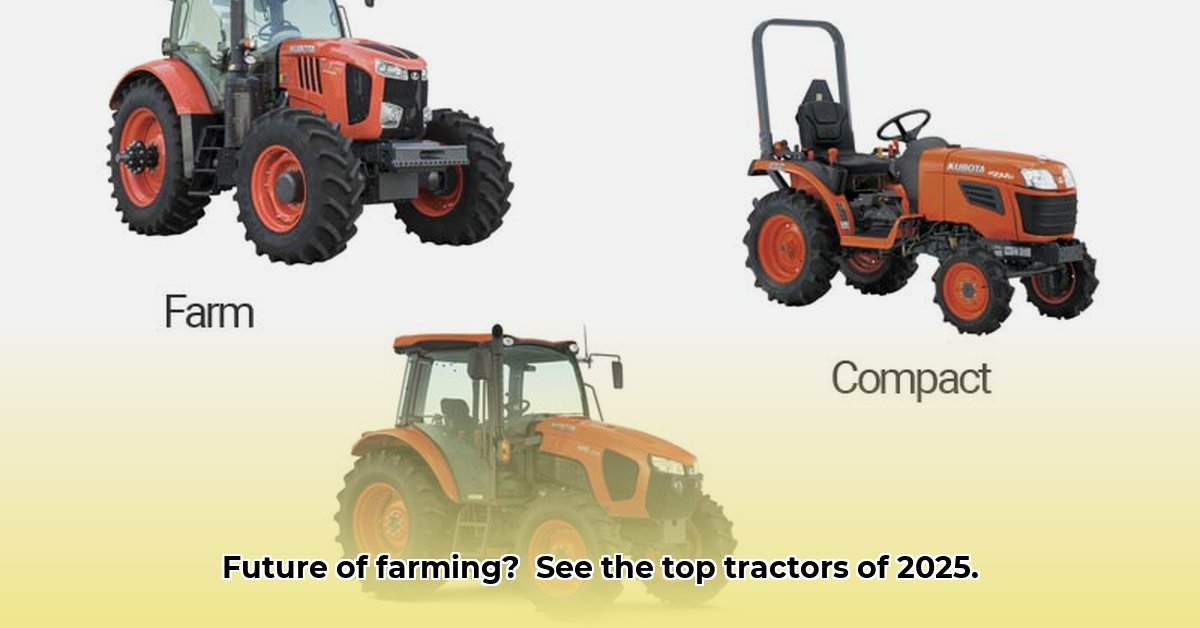
Different Kinds of Tractors and Their Applications
Choosing the right tractor is crucial for efficient and productive farming. Understanding the various types available simplifies this process, regardless of experience level. This guide covers the main tractor categories, their uses, and considerations for selection. For pricing information on popular brands, check out this helpful resource on Kubota tractor prices: Kubota Tractor Prices.
Compact Tractors: Ideal for Smaller Properties
Compact tractors are versatile machines suited for smaller farms, homeowners, and hobbyists. Their manageable size and impressive power make them suitable for various tasks, including mowing, tilling, and light hauling. However, their power limitations restrict their use in heavy-duty applications or large-scale farming operations. They're surprisingly powerful for their size and remarkably maneuverable, making them perfect for tight spaces.
Sub-Compact Tractors: Maneuverability and Efficiency
Sub-compact tractors prioritize agility and precision in confined areas. Their small footprint makes them ideal for navigating obstacles in orchards or gardens. These tractors are efficient for delicate tasks but lack the power of larger models, restricting their use in heavier operations. Their maneuverability, however, is unmatched in tight spaces.
Mid-Range Tractors: The Versatile Workhorses
Mid-range tractors balance power, versatility, and affordability. They're suitable for a wide range of farming activities, from plowing and tilling to operating various implements. They are a popular choice for many farmers due to their ability to handle a diverse workload without the high cost of heavy-duty models. They are a reliable all-around option.
Heavy-Duty Tractors: Power for Large-Scale Farming
Heavy-duty tractors excel in large-scale farming due to their immense power. They are designed to tackle demanding tasks, including plowing extensive fields, hauling heavy loads, and operating substantial equipment. While their high cost and large size are significant considerations, their superior capability makes them essential for large-scale operations.
Specialized Tractors: Tailored to Specific Needs
Specialized tractors are designed for specific agricultural applications. Vineyard tractors, for example, are highly maneuverable for working in narrow rows, while orchard tractors offer features suited to fruit cultivation. These highly specialized machines showcase the adaptability and innovation within the agricultural equipment industry, constantly striving to meet niche demands.
Autonomous Tractors: The Future of Farming
Autonomous tractors utilize GPS, sensors, and advanced software to operate without a driver. While still a developing technology, they promise increased efficiency and reduced labor costs. However, high initial investment and data security concerns remain obstacles to widespread adoption, although ongoing research continues to make progress in these areas.
Choosing the Right Tractor: A Step-by-Step Guide
Selecting the appropriate tractor involves careful consideration of several factors:
Assess Your Needs: Define the tasks the tractor must perform, considering your current and future workload. Are you primarily tilling, mowing, or hauling heavy loads?
Establish a Budget: Tractor prices vary widely; set a realistic budget to guide your search. Consider not only the initial purchase price but also ongoing maintenance and fuel costs.
Evaluate Your Property Size: The acreage dictates the required tractor size. Smaller farms are better suited for compact tractors, while large properties necessitate heavier models.
Consider Future Expansion: Plan for potential growth – purchase a tractor with the capacity to adapt to future needs. Avoid buying a tractor that will quickly become inadequate.
Research Brands and Models: Compare features, reputation, and warranties from various manufacturers. Don't hesitate to look at user reviews to assess reliability.
Seek Expert Advice: Consult with experienced farmers, agricultural professionals, or equipment dealers for valuable insights and guidance.
Matching Tractors to Your Farm's Needs: A Practical Approach
Selecting a compact tractor for a small farm requires a thorough understanding of your specific needs. This section addresses key considerations to ensure the perfect match.
Horsepower: Small farms typically benefit from tractors in the 18-25 horsepower range, providing sufficient power for various tasks without excessive cost or soil compaction.
Transmission: Hydrostatic transmissions (HST) offer seamless speed control and are ideal for maneuvering in tight spaces. Manual transmissions can be more cost-effective but require more skill.
Three-Point Hitch: This essential feature allows for attaching various implements, offering versatility and expanding the tractor's capabilities.
Fuel Efficiency: Fuel efficiency impacts operational costs and minimizes the environmental footprint. Prioritize models known for their low fuel consumption.
Maintenance and Repair: Choose a model known for reliability and easy access to parts. Frequent repairs and downtime hinder productivity.
Key Takeaways:
- Choosing the right tractor involves a careful assessment of your farm's size, the tasks you need to perform, and your budget.
- Several manufacturers offer excellent compact tractor models, each with unique strengths and weaknesses. Thorough research is essential before making a purchase decision.
- Fuel efficiency, ease of maintenance, operator comfort, and the tractor's compatibility with sustainable farming practices are crucial factors to consider for long-term success.
This guide offers a comprehensive overview of the diverse world of tractors. Remember to prioritize thorough research and careful consideration to find the perfect machine that will enhance your farming productivity and efficiency.